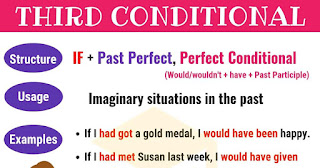Kamis, 19 November 2020
THIRD CONDITIONAL
Rabu, 04 November 2020
SECOND TYPE IF CONDITIONAL
Now, I'll share you about Second Conditional.
When are Second Conditionals Used
Second Conditional is used to express the consequences or consequences of actions or situations that are not realistic in the present or the future. The situation could be:
Has a very low probability (1-5%)
Completely impossible (0%)
Example sentences are,
If I won the lottery, I would travel around the world.
The likelihood of the subject in the sentence winning the lottery is very slim, maybe only about 1%. But if this really happens, then the next clause (travel around the world) will definitely happen.
If I had more free time, I would play more sport.
In that sentence the subject does not have more free time, aka the probability is 0%, but the second clause (play more sports) will definitely happen if the first clause is fulfilled.
How to Make Second Conditionals
To make a sentence in Second Conditional, we can use the following formula,
If + past simple, would / wouldnt + verb.
If I lived in a big city, I would go out more often.
If I lived in a big city, I wouldn't need a car.
As with other conditionals, we can also change the form above to be like this,
Would + verb if + past simple.
I'd go out more often if I lived in a big city.
I wouldnt need a car if I lived in a big city.
As an alternative to the word would, we can use the word could in the second part of the sentence. Examples like the following,
If we lived in the city we could use the public transport.
Exceptions For 'To Be' Verbs
When using the 'to be' verbs (is, am, are, etc.) in the second conditional, the past tense for subjects I, he, she, and it always uses were, not was. Example,
If I were rich, I'd spend all my time traveling.
If he were my boss, I'd look for another job.
If it weren't so cold, we would go for a walk.
Normally, we use was for sentences that use subject I, he, she, or it. But especially for the second conditional, the correct form is were. So, don't use was in sentences like the above, especially in the context of formal writing.
Knowing the Exactly Use of Second Conditionals
Generally, people have difficulty determining whether a sentence uses the second or first conditional. The thing to remember is that we usually use the second conditional only when talking about imaginative things, talking about something that is almost impossible to happen, and what we would do if it came true. The example is:
If we were rich, we would buy a big house near the sea.
What would you do if your company offered you a promotion in another country?
He wouldn't come to the party even if we invited him.
Here are some other examples of the second conditional:
If she studied harder she'd pass her exams easily.
What would you do if you won a lot of money?
I wouldn't give up my job if I won a lot of money.
If we would ski we'd come with you to the mountains.
If people drove more carefully, there'd be fewer accidents.
I'd be amazed if he arrived on time. He's always late.
Would they agree if we offered them a short delivery time?
If I found a burglar in my house I wouldn't know what to do.
You would save time if you worked from home.
Polite Requests
We also use second conditionals to make requests politely. Example,
Would you mind if I used your computer?
Would it be ok if we sat here?
Would it bother you if I closed the window?
The best way to master the use of second conditionals is to practice them over and over
Conversations:
naurah : Look! Mia spends her holiday in New Zealand!
sarah: Wow, she’s so lucky. She has a lot of money.
naurah : If I were her, I would buy a car and build a big house for my parents.
sarah : Nice. I would do the same. I wish I had a lot of money.
naurah : Now let’s study hard so that we can have a good job and earn a lot of money.
sarah: Yes, it’s a good idea.
CONCLUSION:
In Second Conditional has two way :
- If + Pp, Would/'nt + Verb
- If + were, Pp would/ 'nt + verb
LETTER TO GOD
Hey, Hey, Hey!! I'm back again. Now, I'll share with you about the letter. Have you ever write a letter? If I ever made it. What ...

-
Now, I'll share you about Second Conditional. When are Second Conditionals Used Second Conditional is used to express the consequenc...
-
An invitation is document written or printed or spoken words, conveying the message by which one is invited. It is used to invi...
-
Ayoo~ In this blog i'll share about cause-effect. What Is the Cause-Effect? DEFINITION: Cause-effect is a concept that describes the r...






